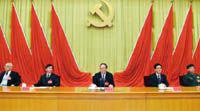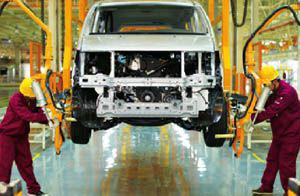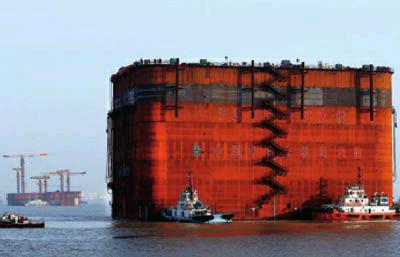Zero Tolerance
2014-12-01
Wang Qishan (center), chief of the Central Commission for Discipline Inspection of the Communist Party of China, speaks during the commissions Fourth Plenary Session in Beijing on October 25.
Wang warned that the Party is facing a severe and complicated situation in curbing corruption.
“Any corrupt officials who go back to their old ways will pay the price,” Wang said. “We will keep pressing the anti-graft campaign, treating sick trees and rooting up the rotten ones.”
He added that the campaign will curb current corruption, clear out its sources and establish an effective system to prevent it.
Constitution Day
Chinas top legislature has designated December 4 as national Constitution Day amid efforts to advance the rule of law.
Nationwide activities to promote the Constitution will be held on the day, according to a bill adopted at a bimonthly session of the Standing Committee of the 12th National Peoples Congress (NPC) from October 27 to November 1.
The Fifth NPC adopted the current Constitution of China on December 4, 1982, based on a previous version enacted in 1954.
At the Fourth Plenary Session of the 18th Communist Party of China Central Committee held on October 20-23, the Party pledged to improve the socialist system of law with Chinese characteristics, of which the Constitution forms the core.
“To realize the rule of law, the country should be ruled in line with the Constitution,” read the communiquéissued after the plenary session.
Space Launch
Chinas fourth space launch center in Wenchang, south Chinas Hainan Province, will launch the countrys next space station and cargo spacecraft, according to Tao Zhongshan, chief engineer of the Xichang launch center.
Tao told Xinhua News Agency on October 26 that the new center will be used mainly for geosynchronous satellites, large-tonnage space stations, cargo spacecraft and large polar orbit satellites.
Wenchang has an advantage for the transportation of modules of spacecraft, as it is located near a seaport. The sites low latitude will also allow an increase in carrying capacity of rockets by about 10 percent, compared to the Xichang Space Launch Center in southwest Chinas Sichuan Province.
The Change-5 moon lander, which will collect samples and return to Earth, will be launched from Wenchang, probably in 2017.
Once put into use, the Wenchang Space Launch Center, along with the three other centers in Xichang, Jiuquan in Gansu Province in the northwest, and Taiyuan in Shanxi Province in the north, will all have different functions.
Chinas Manned Space Agency recently announced that the Tiangong-2 space lab will be launched around 2016, followed by the Shenzhou-11 spacecraft and Tianzhou cargo craft to rendezvous with the lab.
A core module for the space station will be launched around 2018 and the station will be completed around 2022.
Disgraced Ex-General
Xu Caihou, former Vice Chairman of Chinas Central Military Commission(CMC), has confessed to taking bribes, military prosecutors announced on October 28.
The investigation into Xus case has concluded and the filing of the case has begun, said a statement from the military procuratorate.
Xu was found to have taken advantage of his position to assist the promotions of others, accepting huge bribes personally as well as through his family, and to have sought profits for others in exchange for bribes. The amount of the bribes was “extremely large,” the statement said.
The Communist Party of China Central Committee decided to expel Xu from the Party and hand his case to prosecutors at a meeting in June. Xu had been under investigation since March.
Xu, 71, was CMC vice chairman from 2004 to 2012 and was made a general in 1999. He has been discharged from military service with his rank revoked.
Xu was diagnosed with bladder cancer in February 2013 and is still undergoing treatment, a statement on the Ministry of National Defense website said on Tuesday.
Protection Funds
The Ministry of Finance (MOF) has allocated 8.84 billion yuan ($1.45 billion) in special funds to support the protection of cultural heritage this year.
The state funding to cultural heritage protection was 14.35 percent higher than a year ago, according to the MOF on October 28.
About 92 percent of the total funding, or 8.13 billion yuan ($1.33 billion), went to 2,299 cultural heritage protection projects, including the Great Wall, the Great Canal and the Silk Road.
Another 663 million yuan ($108 million) of funding supported efforts to protect non-tangible heritage items.
Joint Aid
China and Japan set up a foundation on October 28 to aid Chinese victims of chemical weapons left behind by Japanese troops during World War II.
Wang Jianlin, Deputy Secretary General of the China Foundation for Human Rights Development, and Minami Norio, a Japanese lawyer, signed the document for setting up the peace foundation in Harbin, capital city of northeast Chinas Heilongjiang Province.
Japan has a foundation for aiding the victims and will cooperate with the equivalent Chinese foundation to provide help to victims hurt by chemical weapons, said Norio, one of more than 30 Japanese lawyers who have been helping Chinese victims sue the Japanese Government.
Official Chinese statistics show Japan abandoned at least 2 million tons of chemical weapons at about 40 sites in 15 Chinese provinces at the end of World War II, most of them in the three northeastern provinces of Heilongjiang, Jilin and Liaoning.
More than 2,000 Chinese have been directly hurt by Japans abandoned chemical weapons.
Group Living
Senior residents make handicrafts in a community care center in Yinchuan, Ningxia Hui Autonomous Region, on October 28.
In Yinchuan, such centers offer new opportunities to elderly people during life after retirement by organizing various leisure activities.
The facilities also help relieve pressure on family members who work away from home and dont have enough time to care for senior family members.
Calm Amidst the Flames
Firefighters participate in an emergency drill in southwest Chinas Chongqing Municipality on October 28.
Antarctic Plane
Official sources have confirmed Chinas plan to deploy its first fixed-wing aircraft for Antarctic research in 2015.
China purchased a Basler BT-67 from the United States, an aircraft used by other countries on the continent. It is capable of flying in temperatures of minus 50 degrees Celsius on transportation, rescue and research missions, said Qu Tanzhou, head of the Chinese Arctic and Antarctic Administration.
The countrys 31st scientific expedition to Antarctica, which set off on October 30, will choose a site for an airfield about 40 or 50 km from Chinas Zhongshan Station in eastern Antarctica, Qu said.
He added that it was also possible that China could share a Russian airfield near the station.
China has also planned to build an aviation network in eastern Antarctica to support field research, transportation and emergency response.
Favorable SME Policies
Chinese Vice Premier Zhang Gaoli has reassured small and medium-sized enterprises (SMEs) that supportive measures to help them weather the current downward trend and stimulate economic growth are a priority.
Zhang urged administrations and local authorities to genuinely implement favorable policies announced by the Central Government for SMEs when visiting small firms in east Chinas Jiangsu Province on October 27.
Governments at all levels should continue to reduce burdens on the SMEs through simplified administrative procedures, tax breaks and improved financing channels, he said.
He stressed that the government should help SMEs to be innovative, to create new intellectual property and establish their own brands, which will make them capable of going out to compete with international rivals.
A government-led service platform to help companies address problems when starting out is also expected, he said.
Small firms are irreplaceable in boosting economic growth, making technological innovations, creating jobs and enhancing peoples well-being, Zhang said.
In addition, Zhang called for confidence in Chinas economy and said the governments should also be clearheaded and make practical efforts in a bid to fulfill major economic and social targets of the year.
LNG Terminal
Chinas first floating liquefied natural gas (LNG) terminal completed its first phase of construction in the northern port city of Tianjin on October 28.
Covering an area of 75 hectares and designed to supply 3 billion cubic meters of gas each year, it can supply imported LNG to energy-thirsty cities such as Beijing and Tianjin, said the China National Offshore Oil Corp., which owns the terminal.
The facilitys two low-temperature storage tanks have a capacity of 30,000 cubic meters of gas each and have been built specifically for the project. Construction began in 2012 with a total investment of 3.3 billion yuan($537 million).
The terminal is one of the key projects for air pollution prevention in the Chinese capital. It will also supply natural gas to Hebei and Shandong provinces in the long run.
Floating LNG facilities can be moored offshore and allow energy companies to store, regasify and supply LNG close to markets.
Capacity for Expansion
Workers mount tires on a cars rims in a factory of JAC Motors.
With a total investment of 1.36 billion yuan ($222 million), the new production base in Mengcheng, Anhui Province, entered into use on October 28. It can produce 150,000 units every year and its annual output value can reach 12 billion yuan ($1.96 billion).

Acquisitions Completed
Chinas state-owned foodstuffs conglomerate COFCO Corp. announced the completed acquisition of controlling stakes in two global agricultural commodities traders on October 28.
COFCO said the two investment deals—a 51-percent stake in Netherlands-based grain trader Nidera and a 51-percent stake in the agricultural unit of Hong Kong-headquartered commodities trader Noble Group—have gone through acquisition examinations and are now complete.
A consortium of investors led by COFCO, including Hopu Investment and Temasek, has taken part in the two deals, with investment from COFCO at over $3 billion, COFCO Chairman Ning Gaoning disclosed at a press conference on October 28.
Nidera, a leading trader of grains and soybeans among other agricultural commodities, has an active presence in more than 20 countries, while Noble Group is one of the worlds largest traders in agricultural, minerals and energy products.
Ning said the acquisitions will enable the firm to engage more deeply with the global grain and oil trading platforms and pave the way for the building of an international conglomerate.
After the two deals, COFCOs assets
now exceed $57 billion, with revenues amounting to $63.3 billion, according to the company.
Asked whether the firm would conduct more acquisitions, Ning said there will not be any large-scale moves in the near future, but some small ones are likely.
Sino-Sri Lanka FTA
A proposed Free Trade Agreement (FTA) between Sri Lanka and China is to be signed in June 2015, Deputy Secretary to the Treasury S. R. Attygalle said on October 28.
Sri Lanka President Mahinda Rajapaksa also noted the same time frame during a budget presentation to parliament on October 24.
The FTA, which was initially to be signed by the end of 2014, is expected to boost Sri Lankas future development and promote trade between the two countries, which have been developing increasingly closer economic and trade relations in recent years.
A joint feasibility study on the proposed FTA was completed in March 2014 and concluded that the building of an FTA will bring benefits to both countries.
Although Sri Lankas exports to China increased from $28.39 million in 2005 to $121.63 million in 2013, trade balance remains significantly in favor of China. Bilateral trade reached $3.62 billion in 2013.
Sri Lanka hopes the FTA will help the country gain easier access to the Chinese market and gradually reduce its trade deficit in respect to the worlds second largest economy.
A World First
The positioning of the No.29 open caisson of the Shanghai-Nantong Yangtze River Bridge is completed on October 28.
The structure is the first 1,000-meter-level highway-railway cable-stayed bridge in the world, spanning 1,092 meters. Construction commenced on March 1 and is expected to finish in five-and-a-half years time.
Seeking New Growth
Evergrande Group, a Chinese private conglomerate involved in property development, agriculture and sports, launched an infant formula on October 27 following its acquisition of New Zealand dairy producer Cowala Dairy Ltd.
The Guangzhou-based group also plans to build a dairy-manufacturing base in China to tap into the lucrative market. Chinese consumers have tended toward buying foreign brands following a series of tainted milk scandals in recent years.
The infant formula product will hit the market under the name Cowala nationwide soon, according to an announcement at its launch ceremony on October 27.
Evergrande, which runs Chinas most successful football club, Guangzhou Evergrande Taobao Football Club, appointed three players to serve as global promotion ambassadors for Cowala infant formula on October 27.
The group, established in 1997, made its fortune through real estate development, but has diversified its business in recent years by investing in agriculture, cultural tourism, dairy, livestock and sports.
The groups sales in 2013 reached 100.4 billion yuan ($16 billion), while sales in the first eight months of 2014 reached 90 billion yuan ($14.72 billion), according to its official website.
Rail Merger
Chinas top train makers, China CNR Corp. Ltd. and CSR Corp. Ltd., confirmed on October 28 that the two companies will soon merge to compete globally.
The expected merger will help export Chinas high-speed railway technologies by preventing cutthroat domestic competition between the two, analysts said.
Stock trading for the two companies has been suspended in the Shanghai and Hong Kong stock exchanges pending further announcements.
The two companies are both listed in Shanghai and Hong Kong, with a combined market value of about $30 billion based on the closing price before trading suspension.
CNRs net profit jumped 65.1 percent year on year to reach 3.96 billion yuan ($645 million) for the first nine months, according to its latest quarterly results filed with the Shanghai and Hong Kong stock exchanges on October 28.
